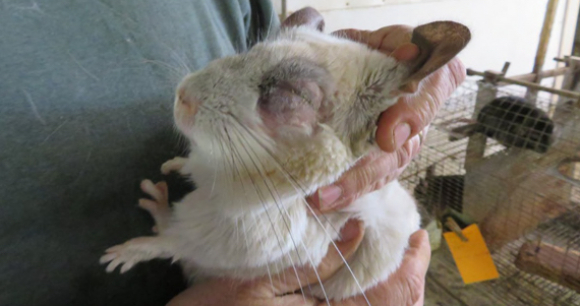
Washington, DC—Citing a pattern of chronic Animal Welfare Act (AWA) violations, an administrative law judge on Friday permanently revoked the dealer license of Dan Moulton, owner of Moulton Chinchilla Ranch (MCR), one of the nation’s only dealers supplying chinchillas for experimentation.
In a rare decision issued from the bench following an 18-day hearing, US Department of Agriculture Administrative Law Judge Jill Clifton deemed Moulton “unfit” to hold an AWA license and described his animal welfare violations as “absolutely astounding.” She also fined him $18,000. This is only the second time in 18 years that an administrative law judge has rendered an oral decision under the AWA from the bench, which only underscores the severity of Moulton’s violations related to animals’ health, sanitation, and safety.
The Animal Welfare Institute (AWI) has repeatedly raised concerns about the abysmal conditions at MCR and has called out the USDA for failing to enforce the AWA against this dealer. Since 2014, Moulton has amassed the worst animal care record of the 10,000+ entities regulated under the law, as the USDA itself has documented. Yet the USDA, the research industry, and state and local law enforcement repeatedly refused to act, even after MCR had been cited for more than 100 AWA violations on USDA inspection reports.
“During the hearing, Judge Clifton said she was ‘shocked’ by Moulton’s blatant disregard for basic animal welfare protections,” said Eric Kleiman, a researcher for AWI. “She is right. It shocks the conscience that for years and years the USDA allowed what it called the ‘immense, avoidable suffering’ of untold numbers of chinchillas at Moulton.”
“While this ruling seeks to shut down one notorious dealer, the appeals process can drag on for years,” Kleiman added. “We appreciate the judge’s action, but it does not excuse the department’s persistent failure to protect animals. These animals should have been seized years ago, as is prescribed under the AWA, to prevent further harm.”
Photographs from years of USDA inspections document abysmal conditions at MCR: animals’ eyes crusted, sealed, swollen shut, bleeding, and oozing fluid; collars embedded in animals’ necks; protruding bones; soiled food; and green drinking water. During one inspection, an inspector found a dead chinchilla who had been left for so long that she had to be peeled off the top of the cage. Inspectors testified during the hearing, over Moulton’s repeated objections, to the suffering they have witnessed. A veteran inspector testified that MCR was the worst facility he had ever seen, and that it gave him nightmares. Other inspectors stated that the conditions were "egregious," "stunning," and "atrocious.” A veterinary supervisor indicated that he had never seen violations this bad.
According to MCR, these all were overblown accusations from inspectors “looking for anything to cite.” Sanford Feldman, director of comparative medicine at the University of Virginia—who was identified at the hearing as Moulton’s “technical advisor” and testified in Moulton’s defense—told Science last year that the chinchillas are not “suffering terribly,” that Moulton wants to “do right by the animals,” and likened the historic violations to a speeding ticket for going 26 mph in a 25 mph zone. He refused to be interviewed by Science about the hearing.
In its November 2018 complaint, the USDA alleged that Moulton had repeatedly failed to provide veterinary care and to be available for inspectors to evaluate compliance with the AWA. The complaint cited repeated failure to remove excessive build-up of waste, shavings, dust, water, fur, and dead animals in the cages, as well as a failure to maintain structurally sound enclosures, provide adequate lighting, use clean water receptacles, employ a sufficient number of staff, and control flies. Yet, after years of horrific inspection reports and the filing of this complaint, the USDA helped Moulton with the paperwork to renew his license in 2019.
MCR has supplied chinchillas to some of the most prestigious research institutions in the world, including the National Institutes of Health, Harvard Medical School, and Boston University. Chinchillas have large ears and hearing similar to humans, so they are often used for research on ear diseases. The American Association for Laboratory Animal Science actively promotes Moulton on its online Buyers Guide, with an ad paid for by Moulton to be in the guide’s Vendor Showcase.
“The Animal Welfare Act must be enforced,” Kleiman concluded. “If licensees can continue to operate despite such flagrant violations of the law, then the license holds no meaning. Moreover, the research industry must be held accountable for turning a blind eye to dealers cited over and over by USDA inspectors for such appalling mistreatment.”
Marjorie Fishman, Animal Welfare Institute
[email protected], (202) 446-2128
The Animal Welfare Institute (awionline.org) is a nonprofit charitable organization founded in 1951 and dedicated to reducing animal suffering caused by people. AWI engages policymakers, scientists, industry, and the public to achieve better treatment of animals everywhere—in the laboratory, on the farm, in commerce, at home, and in the wild. Follow us on Facebook, Twitter, and Instagram for updates and other important animal protection news.